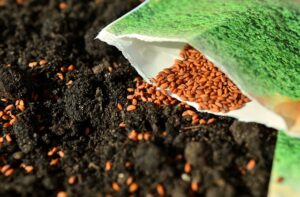With the increasing concerns about environmental sustainability and health, more and more people are turning to organic farming. As a result, there is a growing demand for non-GMO seeds, also known as heirloom or heritage seeds. These seeds have not been genetically modified in any way and have been passed down through generations of farmers.
Non-GMO seeds offer numerous benefits for both the environment and human health. Let’s take a closer look at why they are gaining popularity and what impact they could have on the future of agriculture.
Why choose non-GMO seeds?
There are several reasons why farmers and consumers are opting for non-GMO seeds over genetically modified ones:
- Environmental sustainability: Non-GMO seeds promote biodiversity and help maintain a healthy ecosystem. On the other hand, genetically modified seeds are engineered to be resistant to certain pesticides, leading to a decline in beneficial insects and pollinators.
- Health benefits: While there is ongoing debate on the potential health risks of consuming GMOs, many people prefer non-GMO products for peace of mind. These seeds do not contain any artificial modifications or chemicals, making them a healthier option.
- Food security: By using non-GMO seeds, farmers can preserve traditional crop varieties that have adapted to specific environmental conditions over time. This makes them more resilient to climate change and reduces the risk of crop failures due to disease outbreaks.
In turn, this can help improve food security in the long run.
The impact on agriculture
The shift towards non-GMO seeds is not just a trend – it has the potential to significantly impact the future of agriculture. Here are some ways in which this could happen:
- Support for small-scale farmers: Non-GMO seeds are often produced by small-scale and local farmers, rather than large corporations. This can provide economic opportunities for these farmers and support sustainable farming practices.
- Improved soil health: GMO crops often require heavy use of herbicides and pesticides, which can harm soil health over time. By using non-GMO seeds and organic farming methods, soil fertility can be maintained or even improved.
This is crucial for sustainable agriculture and long-term food production.
- Lower costs: Genetically modified seeds are often more expensive than non-GMO seeds, making them inaccessible for small farmers or developing countries. They are also patented and made in such a ways they need to be bought every year. By utilizing non-GMO seeds, the cost of farming can be reduced, leading to more affordable food prices. This is especially important in regions where food insecurity and poverty are prevalent.
- Diversification of crops: GMO crops are typically monocultures – a large area planted with one type of crop. This can lead to soil depletion and an increased risk of crop failure if a disease outbreak occurs. Non-GMO seeds promote diversity in farming practices, allowing for the cultivation of various crops on a single plot of land. This reduces the risk of crop failure and can also improve overall soil health.
- Preservation of biodiversity: The use of non-GMO seeds allows for the preservation of traditional seed varieties, which may be lost due to the dominance of GMO crops. These traditional seeds often have unique characteristics that are beneficial for specific environments or purposes. By preserving them, we can maintain the genetic diversity essential for sustainable agriculture.
Open pollination and cross-pollination: Non-GMO seeds are often open-pollinated, meaning they can be pollinated by natural processes such as wind or insects. This allows for the exchange of genetic material between different plants, leading to diverse and resilient crops. In contrast, GMO seeds are often genetically engineered to be sterile, preventing cross-pollination and limiting diversity in the crop.
- Consumer choice: As consumers become more aware of the potential risks and ethical concerns surrounding GMOs, they are seeking out non-GMO options. By utilizing non-GMO seeds, farmers can cater to this demand and provide consumers with a choice in what they eat.
- Supporting small-scale farming: Many small-scale farmers cannot afford the high costs associated with purchasing and using GMO seeds. By utilizing non-GMO seeds, these farmers can continue their traditional practices without being forced to adopt costly technologies. This supports local economies and helps maintain cultural practices that have been passed down for generations.
- Food sovereignty: Non-GMO seeds allow communities to have control over their food production and avoid dependency on large corporations for seed supply. This promotes
- Long-term effects on health and the environment: While there is still ongoing research on the potential long-term effects of GMOs on human health and the environment, many people are concerned about the potential risks associated with consuming genetically modified foods. By using non-GMO seeds, we can reduce these concerns and promote a more sustainable and healthier food system.
In conclusion, while there are ongoing debates about GMOs and their potential benefits, the shift towards non-GMO seeds is gaining momentum as a way to promote more sustainable and resilient agricultural practices.

